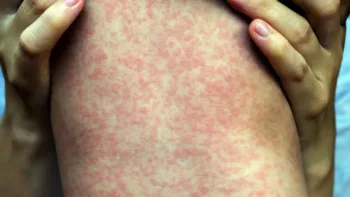
Measles was once considered eliminated in the United States. But now, in 2025, it’s back—and spreading. Over 300 measles cases have been confirmed nationwide as of March, surpassing last year’s total. For families already dealing with financial strain, adding a preventable illness into the mix is one more stressor that no one needs.
So why is measles making a comeback? And how can you protect yourself and your loved ones?
What Is Measles and Why Is It Dangerous?
Measles isn’t just a rash or a fever—it’s a serious, highly contagious viral illness that can lead to complications like pneumonia, ear infections, and diarrhea. In rare but very real cases, it causes brain inflammation (encephalitis) or a long-term degenerative brain disease known as SSPE, which is fatal.
The virus spreads easily through the air, meaning it can hang in the air long after a contagious person has left the room. If you’re not vaccinated, your chances of catching measles after exposure are about 90%.
That’s why even a few cases can become outbreaks—especially in under-vaccinated communities or areas where people live closely together.
How Effective Is the Measles Vaccine?
The MMR vaccine (measles, mumps, rubella) is extremely effective. After two doses, more than 97% of people are immune to measles. And for those who don’t respond to the first dose, the second provides a backup.
Importantly, the vaccine is safe, and side effects are typically mild. You cannot catch measles from the vaccine; it won’t harm you if you’re immune.
Children should get their first dose after their first birthday and the second between ages 4 and 6. Adults who aren’t sure of their vaccination status can ask their doctor about getting a dose to stay protected.
Why Is This Happening Now?
Experts say the recent rise in measles is linked to declining vaccination rates, fueled by misinformation. Some families are choosing not to vaccinate based on false or misleading claims. But the science is clear: vaccines are one of the most powerful tools we have to prevent deadly diseases.
Before the vaccine became widely available, hundreds of Americans died from measles every year. Now, we have the means to stop it—if enough people are vaccinated.
Some Communities Are Hit Harder Than Others
While measles can affect anyone, it spreads faster in communities where healthcare access is limited or vaccination rates have dropped. This can include low-income neighborhoods, rural areas, and places where false vaccine information has taken hold. When fewer people are vaccinated, outbreaks grow faster—and those who can’t get vaccinated for medical reasons are put at the highest risk.
Protecting Your Family and Community
If measles is in your area, talk to your provider—especially if someone in your household isn’t vaccinated or has a weak immune system. If you’re exposed, don’t wait. Call your doctor before going to a clinic, wear a mask, and isolate if symptoms appear.
Vaccines don’t just protect one person. They protect your neighbors, your elders, and your kids’ classmates. Measles doesn’t have to spread—but it takes all of us to stop it.



